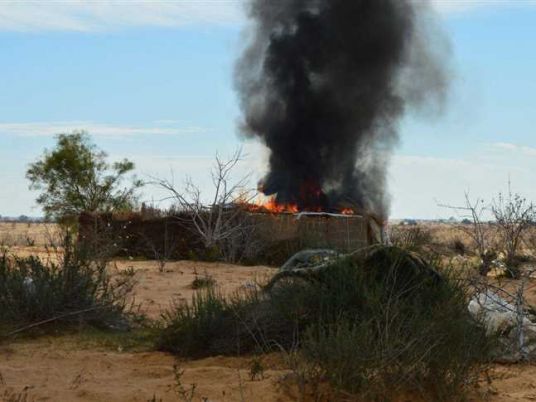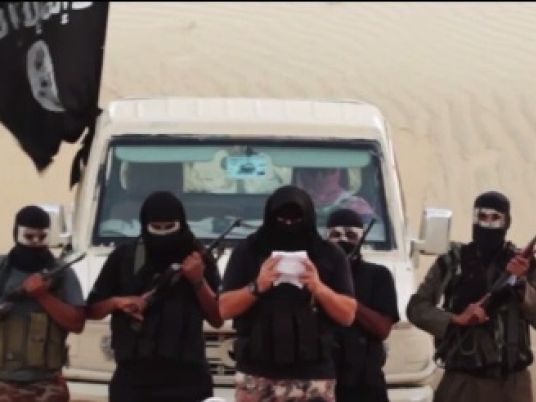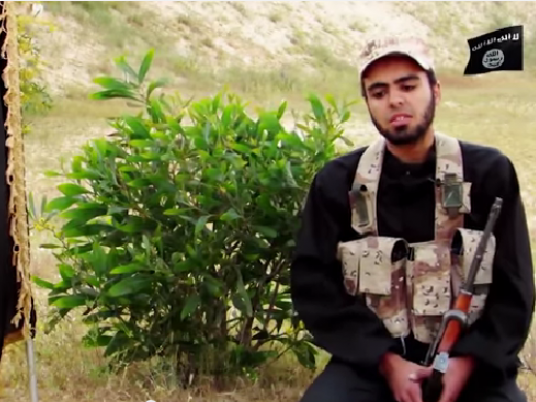
Ansar Bayt al-Maqdis, an Al-Qaeda-inspired group based in Sinai has uploaded a video on YouTube of the explosion that targeted a bus full of army personnel in North Sinai's provincial capital El-Arish on 20 November and left 11 army conscripts dead with 34 others injured.
The video opens with a member of Ansar Bayt al-Maqdis writing the name of the group on the hood of a white car, which is the car used in the detonation, threatening the army and police by writing “the war has not yet begun.”
The video then pans to multiple cameras who wait from afar, the white, explosive-laden car can be seen waiting on the left side of the road. The car is then detonated by remote control as soon as a military convoy, carrying military conscripts, passes.
Though the attack targeted the first bus in the convoy, two buses in the convoy were destroyed.
During the blast, the group’s members video recording the event begin to chant “God is great,” praising the success of the terrorist attack.
The bombing at the North Sinai town of el-Sheikh Zuwayyed was the deadliest in the region bordering Gaza and Israel since an August 19 ambush on a convoy of security forces that killed 25 policemen in the North Sinai town of Rafah.
Army chief General Abdel Fattah al-Sisi attended the soldiers' funeral at a military air base in Cairo. "This matter will only increase our determination," he said in televised comments afterwards.
Shortly after the blast, Egypt's Mufti Dr. Shawki Allam strongly condemned the attack affirming that Islam rejects all forms of violence and is totally against those who terrorize people and destroy the country.
Ansar Bayt al-Maqdis has been involved in other recent attacks as well. The most well known, perhaps, was on 5 September, when the group claimed responsibility for a failed assassination attempt targeting Interior Minister Mohamed Ibrahim in Cairo, also via car bomb.
Militants have stepped up a campaign against security forces in the mountainous Sinai since Morsy's ouster on 3 July, killing scores of troops and police in near-daily attacks.
In response, the military poured troops and armored vehicles into the restive peninsula to combat growing militancy, while it has waged a crackdown on moderate Islamists elsewhere, tightening its grip on Morsy’s supporters and issuing a law to stem the tide of their protests, further increasing the state of polarization in the country.
Tarek Abo al-Saad, a leader who split from Muslim Brotherhood group, said in a phone interview with ONTV broadcaster that the footage aims to hold the group responsible for the blast and meant to raise the morale of the group members after the army’s raids on their hideouts, adding that the terrorist attacks against the army is meant only to exhaust the army.
Nageh Ibrahim, the ideologue of the Gamaa al-Islamiya who abandoned violence after almost 25 years in prison, thinks these Takfiri operatives aspire to establish an Islamic emirate in Sinai, with an ultimate goal of fighting the “Zionist state”.
Ibrahim says Sinai is a hub for radical ideology. “Sinai is an area reminiscent of Peshawar of Pakistan or an area where Hezbollah is growing,” said Ibrahim.
He explained that given Sinai was out of the control of security after 25th January revolution, radical Islamists gained power as there are weapons, men, training and recruitment. Such Islamist’s growing, Ibrahim says, started to flourish as of 25 January 2011 and after Morsy’s ouster, “an international and regional powers [people financing] that wanted to separate this area, using terrorists to wage a war by proxy against the army using radical Islamists for this goal” says Ibrahim




